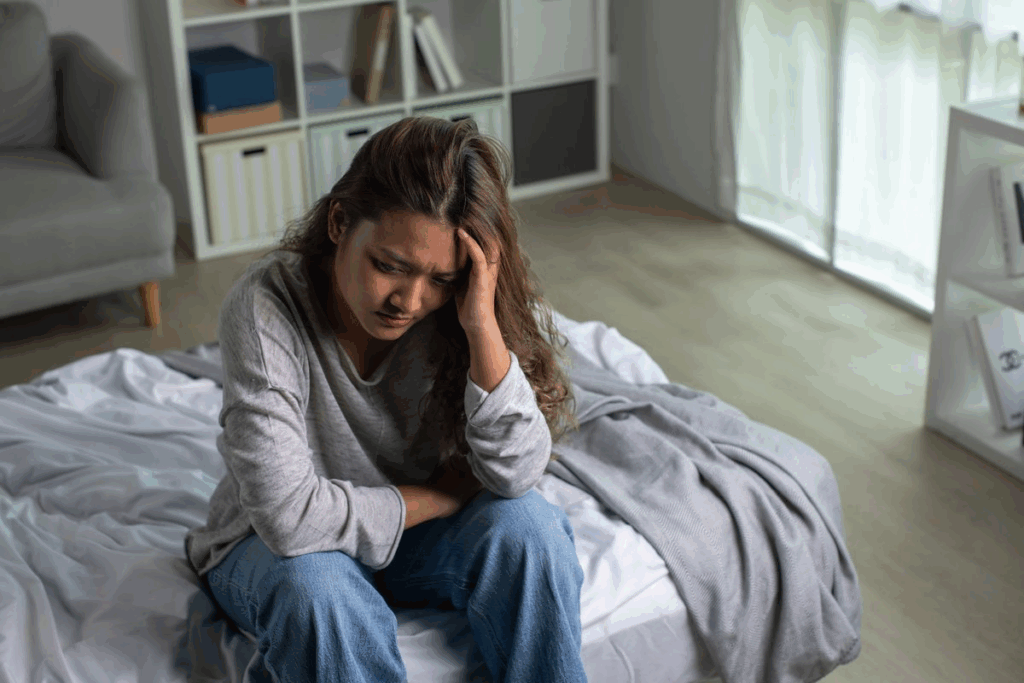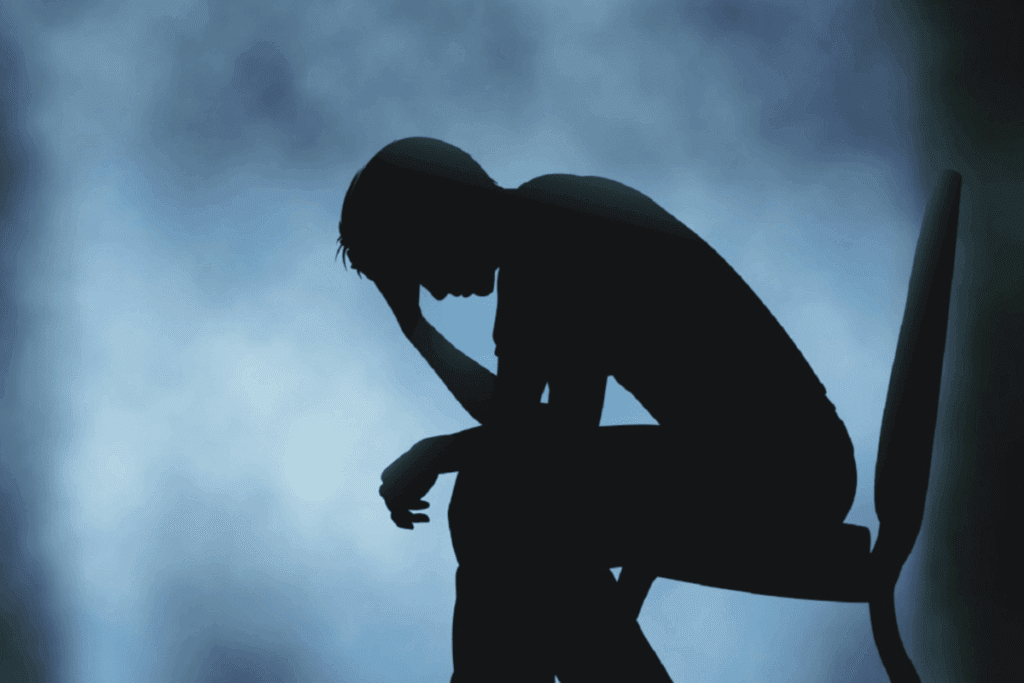
Erectile dysfunction (ED) and depression are closely linked, affecting a person’s life quality. Studies show that depression raises the risk of ED by about 39 percent. Medical Expert, a urologist at Medical organization, explains, “Erectile dysfunction, also known as impotence, is when a man has trouble getting or keeping an erection.”Does depression cause ED (erectile dysfunction)? Learn how the psychological and chemical changes of depression can impact sexual health.
It’s important to understand how these conditions are connected. At Liv Hospital, we focus on treating both the mind and body. We offer care that addresses sexual and mental health issues together.
Key Takeaways
- The relationship between depression and erectile dysfunction is bidirectional.
- Depression significantly increases the risk of developing erectile dysfunction.
- Effective treatment requires addressing both psychological and physical aspects.
- Comprehensive care can improve patient outcomes and quality of life.
- Liv Hospital offers integrated treatment approaches for mental health and sexual dysfunction.
Understanding Depression and Its Impact on Physical Health

Clinical depression is more than just a mental health issue. It affects our physical health in many ways. We see that depression’s effects go beyond emotional pain, touching our physical health.
Common Symptoms of Clinical Depression
Depression shows up in many symptoms that can change our daily lives. Some common ones are:
- Persistent feelings of sadness or hopelessness
- Loss of interest in activities once enjoyed
- Changes in appetite or sleep patterns
- Fatigue or loss of energy
- Difficulty concentrating or making decisions
These symptoms can vary and affect people differently. Knowing them helps us see how depression impacts both mental and physical health.
How Depression Affects Bodily Functions and Hormones
Depression deeply affects our body’s functions and hormone balances. It messes with the brain’s communication with the body. This can lead to less sexual desire and erectile dysfunction.
Depression’s impact on hormones is significant. It can mess with the HPA axis, changing cortisol levels. High cortisol can upset other hormone balances, like testosterone, which is key for sex.
Depression also affects digestion, heart health, and our immune system. The relationship between depression and physical health is complex. Each can make the other worse.
Understanding how depression affects our physical health is key. It shows we need treatments that help both our mental and physical health.
What is Erectile Dysfunction?

Erectile dysfunction (ED) affects millions of men worldwide. It makes it hard to get or keep an erection for sex. This can really hurt a man’s quality of life.
It’s key to know what ED is and how common it is in American men. ED is more than a sex problem. It can hurt a man’s self-esteem, relationships, and overall happiness.
Defining ED and Its Prevalence in American Men
Erectile dysfunction means a man can’t get or keep an erection for sex. It gets more common with age, hitting many men over 40.
Over half of men between 40 and 70 face ED. This shows how common it is. It’s important to understand and talk about it.
Physical vs. Psychological Causes of Erectile Dysfunction
ED can come from physical or mental reasons. Knowing the cause helps find the right treatment.
Physical reasons include diabetes, high blood pressure, and heart disease. These can harm the blood vessels and nerves needed for an erection.
Mental factors like stress, anxiety, and depression can also cause ED. Often, ED is a mix of physical and mental issues.
Cause | Description | Examples |
Physical | Conditions that damage blood vessels and nerves | Diabetes, hypertension, cardiovascular disease |
Psychological | Mental health factors affecting sexual performance | Stress, anxiety, depression |
Lifestyle | Factors related to daily habits and choices | Smoking, excessive alcohol consumption, lack of exercise |
Knowing the causes of ED helps doctors create better treatment plans. These plans aim to fix the problems causing the ED.
The Bidirectional Relationship Between Depression and ED
Depression and ED are not just linked; they influence each other. This means that having one condition can make you more likely to get the other.
A 2018 study in the Journal of Sexual Medicine found a strong link between depression and ED. It showed that men with depression are more likely to get ED. Also, men with ED often struggle with depression.
Statistical Evidence of Connection
Studies show a clear link between depression and ED. People with one condition are more likely to get the other. For example, a review found that men with ED are much more likely to have depression than the average person.
Condition | Increased Risk |
Depression in ED Patients | 192% increased risk |
ED in Depressed Men | 39% increased risk |
The 192% Increased Risk of Depression in ED Patients
Men with ED are 192% more likely to get depression. This shows how ED can affect a man’s mental health. The stress and lower quality of life from ED can lead to depression.
“The presence of ED significantly increases the risk of developing depression, highlighting the need for complete care that covers both physical and mental aspects.”
Which Typically Develops First?
It’s hard to say which comes first, depression or ED. It depends on many things like health, lifestyle, and how well someone handles stress. Some studies say depression might come first, while others suggest ED can lead to depression.
It’s key to understand how depression and ED affect each other. Doctors need to treat both conditions together. This ensures patients get the best care for their body and mind.
Does Depression Cause ED? The Evidence Explained
Depression is now seen as a big risk for erectile dysfunction (ED) in men. Looking into the link between depression and ED shows a complex relationship. It involves many factors.
Research Findings on Depression as an ED Risk Factor
Many studies have looked into how depression and ED are connected. They’ve found that depression can lead to ED. This is due to psychological, neurological, and hormonal reasons.
- A meta-analysis of 11 studies found a significant correlation between depression and an increased risk of ED.
- Depressed men are more likely to experience reduced libido and sexual satisfaction.
- The presence of depression can make ED symptoms worse, creating a hard cycle to break.
The 39% Increased Risk of ED in Depressed Men
Recent research shows that depressed men face a 39% increased risk of ED. This shows how depression can affect sexual function and overall health.
The increased risk comes from several factors. These include:
- Hormonal imbalances, like lower testosterone levels.
- Abnormalities in neurotransmitters that affect sexual arousal.
- Psychological factors, like lower self-esteem and performance anxiety.
Incidence Rates and Population Studies
Population studies have given us important data on ED in depressed men. They help us understand the risk and how common ED is in different groups.
Population | Incidence Rate of ED |
Depressed Men | 45% |
Non-Depressed Men | 25% |
The table shows that ED is much more common in depressed men. This highlights the need to treat depression when dealing with ED.
Understanding the link between depression and ED helps doctors create better treatments. These treatments address both the physical and mental sides of these issues.
Psychological Mechanisms: How Depression Leads to Erectile Problems
It’s important to understand how depression can cause erectile dysfunction. Depression changes how we think and feel, affecting our sex life.
Depression can make people feel bad about themselves, guilty, and anxious. This makes it hard to get or keep an erection. The fear of not being able to get an erection can make things worse.
Performance Anxiety and Negative Thought Patterns
Performance anxiety is a big problem for men with depression. It makes them worry about not doing well, which adds to their anxiety. This can make sex even harder.
Thinking negative thoughts and seeing erectile dysfunction as a failure can make things worse. It makes people feel like they’re not good enough.
Reduced Sexual Interest and Libido
Depression can also lower sexual desire. This is a big part of why men with depression might have trouble getting an erection. When you don’t feel like sex, it’s hard to get excited or stay hard.
This drop in libido comes from changes in hormones and brain chemicals that happen with depression.
Impact on Intimate Relationships
Depression can also hurt relationships. It can make it hard to talk and feel close to each other. This makes erectile dysfunction even harder to deal with.
Partners might get upset or confused, leading to blame and guilt. This makes things even worse.
Psychological Factor | Impact on Erectile Function | Potential Solution |
Performance Anxiety | Increased anxiety leading to erectile dysfunction | Cognitive-behavioral therapy |
Negative Thought Patterns | Reinforces feelings of inadequacy and failure | Mindfulness and positive self-talk |
Reduced Libido | Decreased sexual desire and arousal | Hormonal therapy and counseling |
Biological Pathways Connecting Depression and ED
It’s important to understand how depression and ED are connected. This connection involves many physical and mental factors.
Hormonal Imbalances and Testosterone Levels
Depression can lead to hormonal imbalances, including low testosterone. Low testosterone can make sex less appealing and harder to achieve. This can cause ED.
Studies have found that men with depression often have lower testosterone. This imbalance affects both sex drive and erectile function, making it hard to break the cycle.
Hypothalamic-Pituitary-Adrenal Axis Dysfunction
The HPA axis is key in handling stress. In depression, it’s often too active, producing more stress hormones like cortisol. Chronically elevated cortisol levels can mess with many bodily functions, including sex.
This issue can also affect the release of GnRH, which is vital for testosterone production. This disrupts the hormonal balance needed for normal erections.
Neurotransmitter Abnormalities Affecting Sexual Function
Neurotransmitters like serotonin, dopamine, and norepinephrine are important for mood and sex. In depression, their balance is off. For example, SSRIs, used to treat depression, can sometimes cause ED by raising serotonin levels.
Dopamine is key for sexual excitement and pleasure. Depression can lower dopamine levels or affect its function. This can lead to less sex drive and ED.
Antidepressant Medications and Sexual Side Effects
Many antidepressants, like SSRIs, can cause sexual side effects, such as erectile dysfunction. The link between antidepressants and sexual problems is complex. It involves both mind and body factors. We need to understand these effects and how they affect people.
SSRIs and Their Impact on Erectile Function
SSRIs are a common type of antidepressant. They help with depression but can also cause sexual problems. These problems include lower libido, delayed orgasm, and erectile dysfunction.
The exact reason for these side effects is not fully known. But it’s thought that SSRIs affect serotonin levels in the brain. This can impact sexual function.
Research shows that 30% to 60% of people taking SSRIs experience sexual dysfunction. This wide range shows how different people react to these medications. It highlights the need for personalized treatment.
Other Antidepressants and Their Sexual Side Effect Profiles
SSRIs are not the only antidepressants that can cause sexual problems. Other types, like SNRIs, can also affect sexual function. Some antidepressants, like bupropion, may have fewer sexual side effects.
Older antidepressants, such as TCAs and MAOIs, can also cause sexual side effects. The side effects of these medications can vary a lot. Some may be more likely to cause sexual problems than others.
Managing Medication-Induced Sexual Dysfunction
Dealing with sexual problems caused by antidepressants needs a detailed plan. One way is to adjust the dosage or switch to a different antidepressant. For example, switching from an SSRI to bupropion might help with sexual side effects while keeping depression under control.
Another strategy is to add a medication that can help with sexual side effects. Drugs like PDE5 inhibitors (e.g., sildenafil) can improve erectile function in men taking antidepressants. Counseling or sex therapy can also help with the emotional impact of sexual problems.
It’s important for doctors to talk about the possible sexual side effects of antidepressants with patients. By understanding the risks and benefits, patients can make better choices. They can work with their healthcare team to manage any side effects that come up.
When ED Leads to Depression: The Reverse Relationship
Depression can cause erectile dysfunction (ED), but ED can also lead to depression. This shows how sexual health and mental well-being are connected.
ED can hurt a man’s self-esteem and confidence. It can make him feel inadequate and stressed. This can make the problem worse.
Psychological Impact of Sexual Dysfunction on Mental Health
ED can have a big impact on a man’s mind. It can make him feel less masculine and less confident. This can lead to him feeling isolated and less connected with his partner.
The emotional toll of ED should not be underestimated. It can cause feelings of frustration, anger, and despair. These feelings can lead to depression.
Self-Esteem, Masculinity, and Identity Issues
ED can make a man question his sense of self and masculinity. The idea that men should be able to perform sexually can make him feel inadequate.
This can lead to a crisis of identity. Addressing these issues is key to reducing the psychological impact of ED.
Psychological Impact | Effect on Mental Health |
Loss of masculinity | Increased risk of depression |
Decreased self-esteem | Anxiety and stress |
Social withdrawal | Isolation and loneliness |
Relationship Strain and Communication Problems
ED can strain relationships and cause communication problems. Partners may feel unheard or unappreciated. This can make things worse.
Talking openly is important. Couples should discuss their feelings and needs. This can help them understand each other better.
By recognizing the psychological effects of ED, we can help improve mental health and overall well-being.
Diagnosing Depression-Related ED
To diagnose depression-related erectile dysfunction, we take a detailed look at both physical and mental health. Getting the diagnosis right is key to treating it well.
Medical Assessment Approaches
First, we do a thorough medical check to find out why ED might be happening. We look at the patient’s health history, what medicines they’re taking, and their lifestyle. We also do physical checks and might run tests to see if there are hormonal or vascular problems.
Here’s what we focus on in the medical check:
- Reviewing the patient’s medical history
- Doing a physical exam
- Running lab tests (like checking testosterone and blood sugar)
Psychological Evaluation Tools
We also use special tools to check the mental health side of ED. These tools help us see if depression or anxiety is playing a role. We use questionnaires and interviews to get a clear picture of the patient’s mental state.
Some tools we use include:
Tool | Description | Use in ED Diagnosis |
Patient Health Questionnaire-9 (PHQ-9) | Checks how severe depression is | Helps spot if depression is linked to ED |
Generalized Anxiety Disorder 7-item scale (GAD-7) | Looks at anxiety levels | Checks if anxiety is affecting ED |
Distinguishing Between Physical and Psychological Causes
It’s important to tell apart physical and mental reasons for ED. We do this by combining what we learn from medical and psychological checks. This way, we get a full picture of how physical and mental health are linked in depression-related ED.
Getting a full view of ED means looking at both physical and mental health. By using both kinds of checks, we can accurately find out if depression is causing ED. Then, we can make a treatment plan that fits each patient’s needs.
Treatment Options for Depression-Induced Erectile Dysfunction
Dealing with depression-induced ED needs a mix of strategies. It’s important to tackle both conditions at the same time. This approach looks at the mental, physical, and social sides of both issues.
Psychotherapy Approaches for Both Conditions
Psychotherapy is key in handling depression-induced ED. Cognitive Behavioral Therapy (CBT) is very helpful. It helps people change their negative thoughts and lower anxiety, which are big problems in both depression and ED.
Other good psychotherapy methods include:
- Interpersonal therapy to better relationships and talk better
- Mindfulness-based therapies to lessen stress and feel better overall
- Psychodynamic therapy to tackle deep psychological issues
Medication Management Strategies
Managing medications is also vital in treating depression-induced ED. Some antidepressants might make ED worse, but picking the right ones and adjusting them can help.
Here are some strategies:
- Use SSRIs with care and watch how they affect sex
- Try bupropion as an antidepressant with less sex side effects
- Look into PDE5 inhibitors to directly tackle ED
Lifestyle Modifications That Improve Both Conditions
Changing your lifestyle can help both depression and ED. Regular exercise, a balanced diet, and enough sleep are key. They boost mood and sex life.
More tips include:
- Stress management like meditation or yoga
- Stay away from too much alcohol and drugs
- Do things that bring joy and relaxation
With a full treatment plan that includes therapy, medication, and lifestyle changes, you can manage depression-induced ED. This way, you can also improve your life quality.
Coping Strategies for Individuals and Couples
Dealing with erectile dysfunction and depression needs a mix of physical and emotional care. It affects not just the person but also their partner and relationship. So, it’s key to use strategies that help with talking, being close, and supporting each other.
Communication Techniques for Partners
Talking openly is key in any relationship, more so when facing health issues. It helps reduce stress and brings you closer emotionally. Use “I” statements to share feelings without blaming, which can make things worse.
For example, say “I feel distant and miss our closeness” instead of “You never want to be intimate.” This change in how you talk can really help your relationship.
Alternative Forms of Intimacy During Treatment
It’s important to keep your relationship close while treating erectile dysfunction and depression. You don’t have to just focus on sex. Sharing feelings, doing hobbies together, or just spending time can also be intimate.
Doing these things can make your bond stronger and feel more normal during tough times. We suggest trying different ways to find what works for you and your partner.
Support Groups and Resources
Support groups are great for those facing erectile dysfunction and depression. They offer a place to share, get advice, and meet others going through the same thing.
We’ve put together a list of resources that might help:
Resource | Description | Contact Information |
ED Support Group | A support group for men dealing with erectile dysfunction | www.edsupportgroup.com |
Depression Alliance | An organization providing resources and support for individuals with depression | www.depressionalliance.org |
Couples Therapy | Professional therapy services for couples dealing with relationship challenges | www.couplestherapy.com |
By using these strategies and resources, you and your partner can handle erectile dysfunction and depression better. We aim to give you all the support you need for a better life.
Conclusion: Managing Both Conditions for Better Quality of Life
Managing erectile dysfunction (ED) and depression together can greatly improve a person’s life. Healthcare providers can create detailed plans to treat both issues at once. This way, they can help patients live better lives.
Depression can make ED worse, and ED can also lead to depression. It’s important to treat both conditions to help with sexual function and mental health.
There are many ways to treat ED and depression, like therapy, medication, and lifestyle changes. A complete care plan can lead to better health and happiness for patients.
By focusing on treating both ED and depression, we can help people take back control of their lives. This approach ensures top-notch care for those dealing with both issues.
FAQ
Can depression cause erectile dysfunction?
Yes, depression can lead to erectile dysfunction. Studies show that men with depression are more likely to face this issue. This is due to both psychological and biological factors.
How does depression affect sexual desire and function?
Depression can lower sexual interest and libido. This makes it harder to get and keep an erection. It also affects intimate relationships, making erectile dysfunction worse.
What is the prevalence of erectile dysfunction among men with depression?
Men with depression are more likely to have erectile dysfunction. Research shows a significant increase in ED risk among depressed men.
Can antidepressant medications cause erectile dysfunction?
Yes, some antidepressants, like SSRIs, can cause erectile dysfunction. But not all antidepressants have the same effect. Some may have fewer sexual side effects.
How can depression-induced erectile dysfunction be treated?
Treatment includes psychotherapy, medication, and lifestyle changes. These address both depression and erectile dysfunction.
Can erectile dysfunction lead to depression?
Yes, erectile dysfunction can lead to depression. It can also cause self-esteem issues and strain relationships.
What are some coping strategies for individuals and couples dealing with ED and depression?
Good coping strategies include communication and finding new ways to be intimate. Seeking support from groups and resources is also helpful.
How is depression-related erectile dysfunction diagnosed?
Diagnosis involves medical and psychological evaluations. These help identify the cause of erectile dysfunction.
Are there any lifestyle modifications that can improve both depression and erectile dysfunction?
Yes, regular exercise, a balanced diet, and stress management can help. These changes can improve both depression and erectile dysfunction.
Can anxiety cause erectile dysfunction?
Yes, anxiety can cause erectile dysfunction. It can lead to performance anxiety and negative thoughts that affect sexual function.
References
- Naber, K. G. (2000). Treatment options for acute uncomplicated cystitis in adults. Journal of Antimicrobial Chemotherapy, 46(Suppl. S1), 23–27. https://www.researchgate.net/publication/12274297_Treatment_options_for_acute_uncomplicated_cystitis_in_adults























